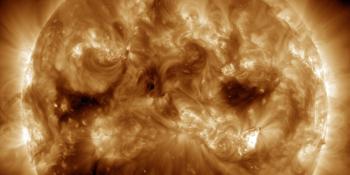Viewing archive of Saturday, 16 June 2012
Solar activity report
Any mentioned solar flare in this report has a scaling factor applied by the Space Weather Prediction Center (SWPC). Because of the SWPC scaling factor, solar flares are reported as 42% smaller than for the science quality data. The scaling factor has been removed from our archived solar flare data to reflect the true physical units.
Report of Solar-Geophysical Activity 2012 Jun 16 2200 UTCPrepared by the NOAA © SWPC and processed by SpaceWeatherLive.com
Joint USAF/NOAA Report of Solar and Geophysical Activity
SDF Number 168 Issued at 2200Z on 16 Jun 2012IA. Analysis of Solar Active Regions and Activity from 15-2100Z to 16-2100Z Solar activity remained low. The largest flare of the
past 24 hours was a C2/1n, which occurred at 16/0048Z from Region
1504 (S17W27). Region 1504 has continued to grow in area, but the
number of spots and magnetic complexity remained stable with a
beta-gamma magnetic configuration. New Region 1509 (S16W43) was
numbered today as an H-type group with an alpha magnetic
configuration.
IB. Solar Activity Forecast
Solar activity is expected to be low
to moderate during the period (17-19 June), with M-class flares
likely from Region 1504.
IIA. Geophysical Activity Summary 15-2100Z to 16-2100Z
Geomagnetic field activity ranged from quiet to active levels. Three
sudden impulses were observed today at 0957Z, 2019Z, and 2115Z (28
nT, 28 nT, and 25 nT, respectively, as measured by the Boulder USGS
magnetometer). ACE data indicated three shock arrivals at around
0900Z, 1931Z, and 2031Z. Solar wind speed ACE increased to around
425 km/s and total field strength reached 10 nT with the first shock
passage, 450 km/s and 17 nT with the second, and 530 km/s and 34 nT
with the third. The greater than 10 MeV proton event began at 1955Z,
reached a maximum flux of 14.4 PFU at 2020Z, and remains in progress
at the time of forecast.
IIB. Geophysical Activity Forecast
Geomagnetic field activity is
expected to be unsettled to active with a chance for minor storm
levels on day 1 (17 June) due to the CME arrivals. Conditions are
expected to decrease to quiet to unsettled on day 2 (18 June) as the
CME effects subside. On day 3 (19 June) conditions are expected to
be mostly quiet.
III. Event Probabilities 17 Jun to 19 Jun
| Class M | 60% | 60% | 60% |
| Class X | 10% | 10% | 10% |
| Proton | 80% | 60% | 40% |
| PCAF | Green | ||
IV. Penticton 10.7 cm Flux
Observed 16 Jun 135 Predicted 17 Jun-19 Jun 135/135/135 90 Day Mean 16 Jun 119
V. Geomagnetic A Indices
Observed Afr/Ap 15 Jun 004/003 Estimated Afr/Ap 16 Jun 007/009 Predicted Afr/Ap 17 Jun-19 Jun 017/020-010/010-006/005
VI. Geomagnetic Activity Probabilities 17 Jun to 19 Jun
| A. Middle Latitudes | |||
|---|---|---|---|
| Active | 35% | 25% | 05% |
| Minor storm | 25% | 10% | 01% |
| Major-severe storm | 05% | 05% | 01% |
| B. High Latitudes | |||
|---|---|---|---|
| Active | 10% | 15% | 15% |
| Minor storm | 25% | 25% | 10% |
| Major-severe storm | 55% | 40% | 05% |
All times in UTC
Latest news
Latest forum messages
jsoc 108Unexplained proton activity 52AR4048 97Temporary Topic - Ongoing Solar Proton Events 14Unspecified geomagnetic activity 2188
More topicsSupport SpaceWeatherLive.com!
A lot of people come to SpaceWeatherLive to follow the Sun's activity or if there is aurora to be seen, but with more traffic comes higher server costs. Consider a donation if you enjoy SpaceWeatherLive so we can keep the website online!

Space weather facts
| Last X-flare | 2025/03/28 | X1.1 |
| Last M-flare | 2025/04/01 | M2.5 |
| Last geomagnetic storm | 2025/03/27 | Kp5 (G1) |
| Spotless days | |
|---|---|
| Last spotless day | 2022/06/08 |
| Monthly mean Sunspot Number | |
|---|---|
| February 2025 | 154.6 +17.6 |
| April 2025 | 147 -7.6 |
| Last 30 days | 129.8 -18.9 |


